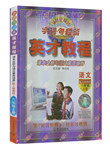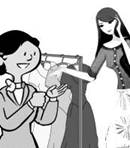题目内容
----May I listen to the music here, Mr White?
----Sorry , you’d better ____ it like that..
- A.not to do
- B.not do
- C.don’t do
- D.not do so
B
试题分析:固定结构had better表示最好做某事,后跟动词原形;其否定形式在动词原形的前面加not即可。结合语境可知是考查had better的否定结构,故选B。
考点:固定结构had better
点评:had better是一固定结构,其用法基本型相当于一个情态动词,通常用在对话中表示建议或劝告,意为“还是……好”、“最好……”。它没有人称、数和时态的变化,had也不能改为has或have。
试题分析:固定结构had better表示最好做某事,后跟动词原形;其否定形式在动词原形的前面加not即可。结合语境可知是考查had better的否定结构,故选B。
考点:固定结构had better
点评:had better是一固定结构,其用法基本型相当于一个情态动词,通常用在对话中表示建议或劝告,意为“还是……好”、“最好……”。它没有人称、数和时态的变化,had也不能改为has或have。

练习册系列答案
 字词句段篇系列答案
字词句段篇系列答案
相关题目
May I have a talk with you, sir? I've got important to tell you.
| A.nothing | B.anything | C.something | D.everything |
请根据下面图片和对话内容,选择最佳答案。
| On Sale T-shirts 88 yuan 65 yuan Dresses 185 yuan 158 yuan Pants 90 yuan 70 yuan Skirts 60 yuan 56 yuan |
Kailey: Yes, please. This dress looks very nice. How much is it?
Saleswoman: It’s only 158 yuan.
Kailey: Really? Is it on sale?
Saleswoman: Yes, it’s usually 185 yuan, but only 158 yuan on Sundays.
Kailey: Great. I’ll buy two dresses for my cousins. They like this kind of dresses.
Saleswoman: What color do they like?
Kailey: Red.
Saleswoman: Oh, I’m sorry. We don’t have any red ones. How about the blue ones?
Kailey: All right. I’ll take them.
Saleswoman: Thanks.
【小题1】 Two T-shirts are on Monday.
| A.130 yuan. | B.176 yuan. |
| C.120 yuan. | D.112 yuan. |
| A.减价销售 | B.正常营业 | C.高价回收 | D.非卖品 |
| A.white pants | B.green shirts |
| C.blue dresses | D.T-shirts |
| A.T-shirts | B.dresses | C.pants | D.skirts |
| A.They are at home now. |
| B.The T-shirt is only 56 yuan. |
| C.Kailey’s cousins like red. |
| D.The skirts are 60 yuan on Sunday |
A: Good morning, Madam. 1
B: Yes, please. I’m afraid I left my handbag in a taxi this morning.
A: 2
B: About 50, 000 dollars.
A: 3
B: Yes, my ID card, I think.
A: What’s your name?
B: Betty White.
A:Just a moment. 4
B:Yes, it’s mine. Thank you so much.
A: 5 The taxi driver found it and brought it here.
B:Oh, what a kind person he is! I want to meet him and thank him.
| A. Nice to see you. B. Anything else? C. You’re welcome. D. Excuse me. E. Is this your handbag? F. What’s in your handbag? G. May I help you? |